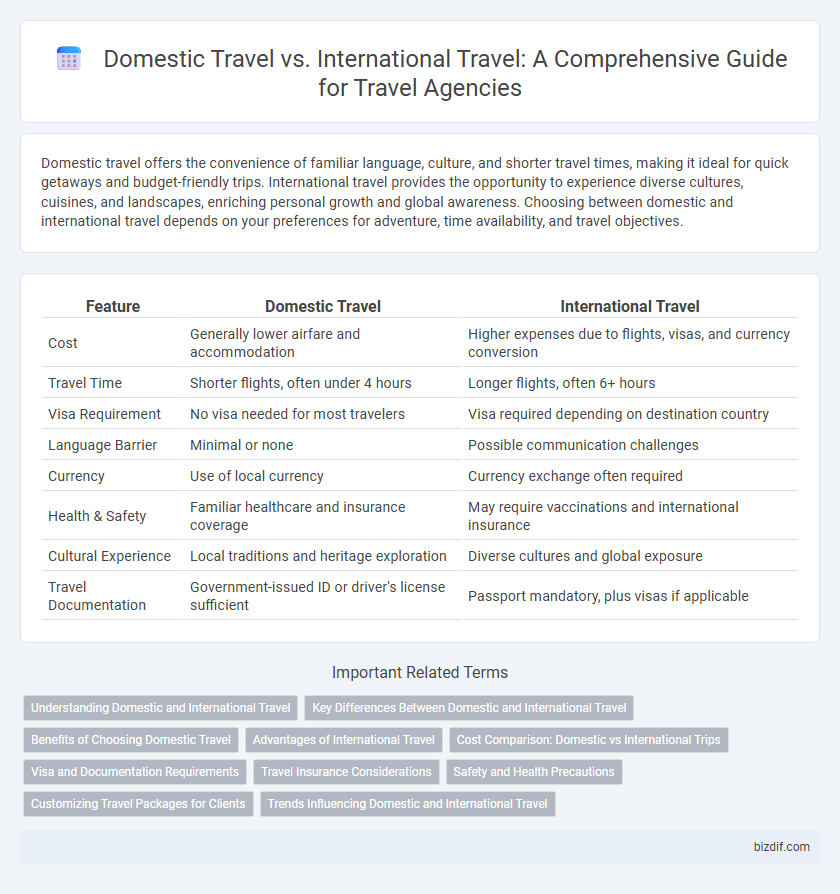Domestic travel offers the convenience of familiar language, culture, and shorter travel times, making it ideal for quick getaways and budget-friendly trips. International travel provides the opportunity to experience diverse cultures, cuisines, and landscapes, enriching personal growth and global awareness. Choosing between domestic and international travel depends on your preferences for adventure, time availability, and travel objectives.
Table of Comparison
| Feature | Domestic Travel | International Travel |
|---|---|---|
| Cost | Generally lower airfare and accommodation | Higher expenses due to flights, visas, and currency conversion |
| Travel Time | Shorter flights, often under 4 hours | Longer flights, often 6+ hours |
| Visa Requirement | No visa needed for most travelers | Visa required depending on destination country |
| Language Barrier | Minimal or none | Possible communication challenges |
| Currency | Use of local currency | Currency exchange often required |
| Health & Safety | Familiar healthcare and insurance coverage | May require vaccinations and international insurance |
| Cultural Experience | Local traditions and heritage exploration | Diverse cultures and global exposure |
| Travel Documentation | Government-issued ID or driver's license sufficient | Passport mandatory, plus visas if applicable |
Understanding Domestic and International Travel
Domestic travel involves exploring destinations within one's own country, offering opportunities to experience local culture, history, and landscapes without the need for passports or foreign currency. International travel requires navigating visa regulations, different languages, and global currencies, providing a richer cultural exposure and diverse experiences. Understanding the distinct planning, costs, and documentation needed for each type ensures a smoother and more enjoyable travel experience.
Key Differences Between Domestic and International Travel
Domestic travel involves exploring destinations within one's own country, typically requiring less travel time, lower costs, and simpler documentation such as only a government-issued ID. International travel demands passports, visas, and greater preparation for customs and immigration procedures, often resulting in higher expenses and longer travel durations. Travelers must also consider language barriers, cultural differences, and international safety regulations when planning overseas trips.
Benefits of Choosing Domestic Travel
Domestic travel offers significant advantages such as lower costs, easier access to emergency services, and reduced travel time, making it an affordable and convenient option for most travelers. Exploring local destinations supports the national economy and enables a deeper cultural connection with regional heritage and traditions. Domestic travel also minimizes the complexities of visas, foreign currency exchange, and language barriers, enhancing overall trip safety and comfort.
Advantages of International Travel
International travel offers unparalleled cultural exposure, allowing travelers to immerse themselves in diverse languages, customs, and traditions that deepen global understanding and personal growth. Access to iconic landmarks and world-renowned cuisine enriches the travel experience, creating lasting memories and unique storytelling opportunities. Furthermore, international trips often provide exclusive shopping, entertainment, and educational experiences not available domestically, enhancing the overall value of travel.
Cost Comparison: Domestic vs International Trips
Domestic travel generally offers lower overall costs compared to international trips due to reduced airfare, fewer visa requirements, and minimal currency exchange fees. Accommodation and daily expenses such as meals and transportation tend to be more affordable within the home country, making budget management easier for travelers. However, international travel often incurs higher costs in flights, travel insurance, and international roaming or data charges, which can significantly increase the total trip expenditure.
Visa and Documentation Requirements
Domestic travel typically requires minimal documentation, often limited to a valid ID or driver's license, making it accessible and less time-consuming for most travelers. International travel involves strict visa requirements, passport validity checks, and additional documentation such as health certificates or travel insurance, which vary by destination country. Understanding these requirements early ensures compliance with immigration laws and smooth border crossings.
Travel Insurance Considerations
Domestic travel insurance typically covers trip cancellations, medical emergencies, and lost luggage within the traveler's home country, often with lower premiums and simplified claim processes. International travel insurance involves broader coverage, including emergency medical evacuation, trip interruption across borders, and coverage for activities restricted in certain countries, often subject to stricter policy requirements. Understanding the specific risks and healthcare systems of the destination is crucial for selecting appropriate travel insurance plans that protect against unforeseen costs and ensure peace of mind.
Safety and Health Precautions
Domestic travel often offers enhanced safety and health precautions due to familiarity with local healthcare systems and faster access to medical facilities. International travel requires thorough preparation, including vaccinations, travel insurance, and awareness of different health regulations and risks in foreign countries. Choosing destinations with reputable safety records and current health advisories can significantly reduce travel-related health issues.
Customizing Travel Packages for Clients
Customizing travel packages for domestic travel allows agencies to tailor experiences based on local culture, attractions, and regional events, ensuring personalized and convenient itineraries. For international travel, packages must consider visa requirements, currency exchange, and cross-border health regulations to provide seamless and secure journeys. Travel agencies benefit from using advanced traveler profiles and preferences data to optimize package customization for both domestic and international clients.
Trends Influencing Domestic and International Travel
Rising fuel costs and stricter travel regulations are shifting traveler preferences towards domestic travel, offering familiar destinations and reduced health risks. On the other hand, increasing digital connectivity and eased visa policies are boosting international travel demand, as tourists seek cultural diversity and unique experiences. Sustainability concerns are influencing both markets, with eco-friendly travel options gaining popularity among conscious travelers.
Domestic Travel vs International Travel Infographic

 bizdif.com
bizdif.com